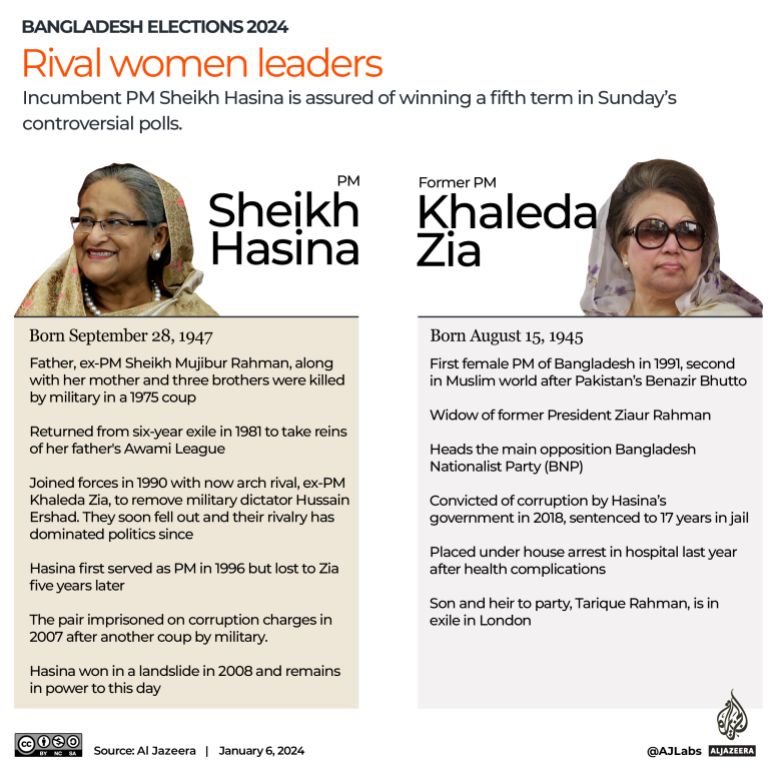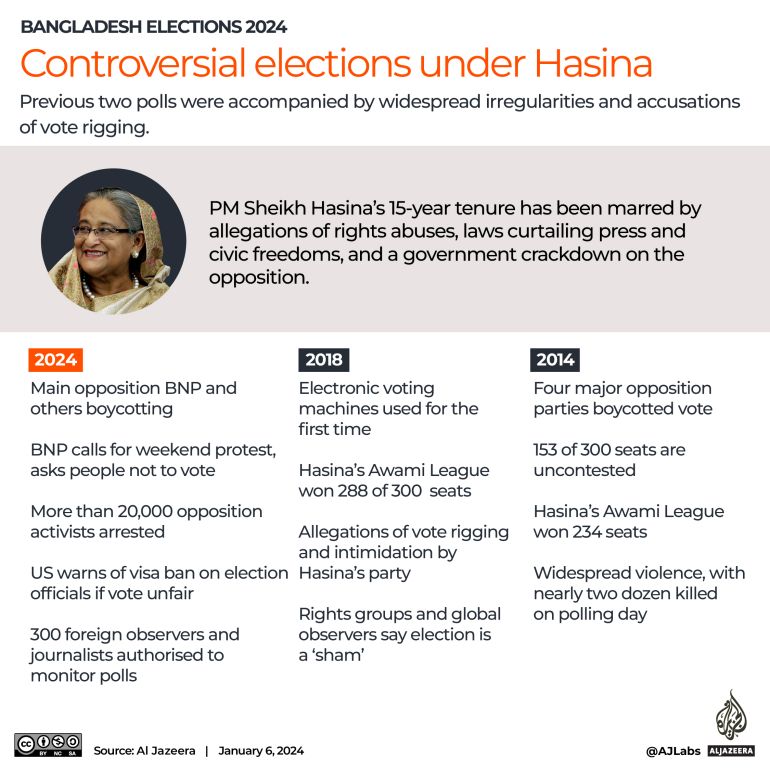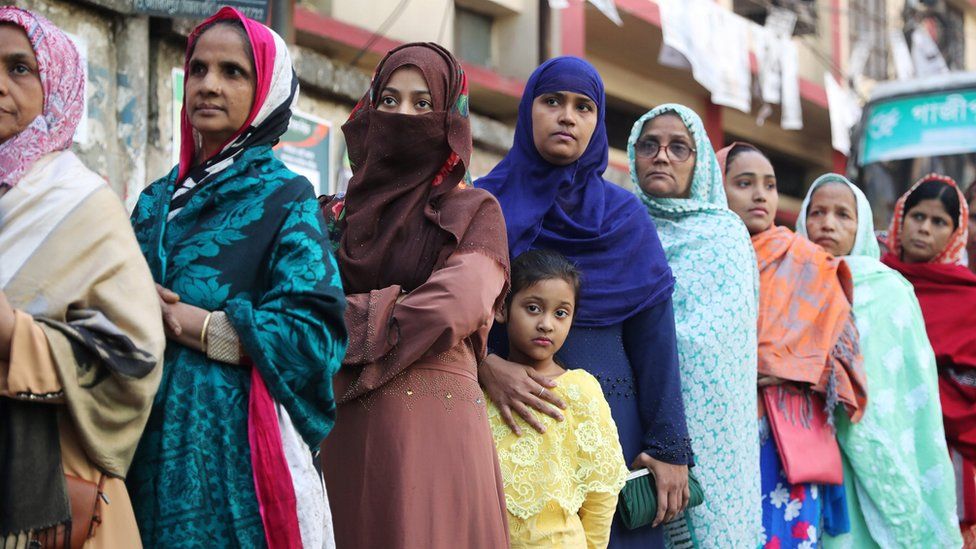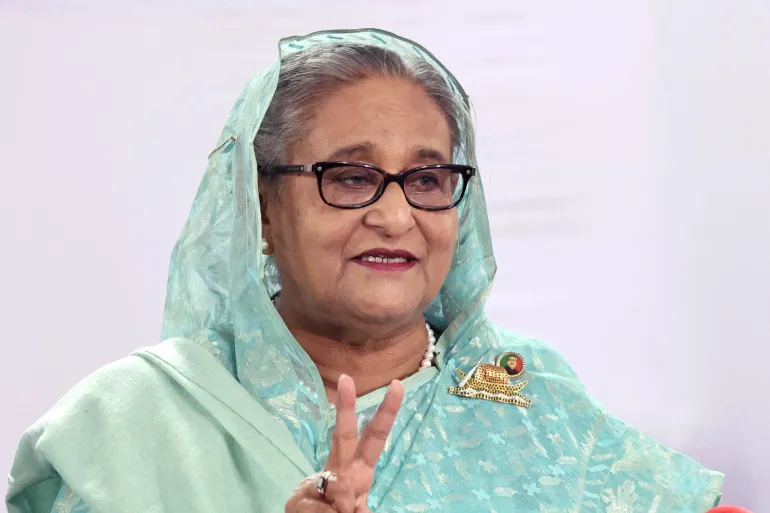Hasina remains the high priestess of Bangladesh’s dynastic democracy
After yet another controversial election victory, PM Sheikh Hasina is set to continue with business as usual, but without a mandate from her people.
It has been said that for the past 15 years, Bangladesh’s elections have been so skewed in favour of the ruling Awami League, they are enough to make North Korea’s Kim Jong Un squirm with envy. An unfair comparison perhaps, but Sunday’s results, where the party, led by Prime Minister Sheikh Hasina, secured 222 seats out of 300, are enough to make even the most unbiased among us raise a sceptical eyebrow.

But should we really be surprised by what was a foregone conclusion? And what does the result mean for the future of Bangladesh? Given that the election was uncontested by the country’s main opposition, the Bangladesh Nationalist Party (BNP), amid concerns that it would be rigged, and with large swaths of the 120 million eligible voters abstaining, it is hardly unexpected that the Awami League swept the board. Officials say some 40 percent of voters went to the polls, but media reports and analysts suggest the real figure is likely not more than 30 percent. Either way, it is clear that the people of Bangladesh voted with their feet.

A look back at the 2018 elections reminds us that the BNP’s concerns were not unfounded. At the time, Human Rights Watch and other groups called for an independent investigation following allegations of voter intimidation, vote rigging and partisan behaviour by election officials. Added to this, a UK broadcaster filmed a filled ballot box being taken away from a polling station before it had even opened. Little wonder, then, that the BNP feared the same would happen again.

More recently, on October 28, the massive antigovernment protest that turned violent signalled a resounding and systematic crackdown on dissent ahead of the elections. On that day, hundreds of thousands of opposition supporters demanded Hasina step down and the installation of a neutral caretaker government. Tens of thousands of protesters, including senior leaders, were arrested and thrown into jail following speedy trials. They included those who had not even been involved in the protests, but instead had cases against them dating back more than a decade. Authorities claim they were cracking down on violence but human rights groups defined what happened as “a violent autocratic crackdown ahead of the election”.
The government denies Sunday’s election was uncontested despite the BNP’s boycott, saying 27 parties took part, as well as independent candidates, and that more than 100 independent election observers were present. But this, though technically true, does not allay concerns. Many of Sunday’s so-called “independents” are Awami League supporters. Bangladeshi media also reported that the party deliberately did not field any candidates in several constituencies, instead making space for its ally, the Jatiya Party.
The road to a one-party state has been a steady one, with Sheikh Hasina – the world’s longest-serving female prime minister – being placed at the helm of the country for a fourth consecutive term and, for all intents and purposes, unchallenged. Ironic for the daughter of the country’s founding father, Sheikh Mujibur Rahman, who, along with her bitter rival, former BNP leader Khaleda Zia, fought so hard for years for multiparty democracy and an end to military rule.
That does not downplay the BNP’s own history of oppression and attacks on democracy. During its two-term rule (1991-96 and 2001-06), it was confronted with many of the accusations currently faced by the Awami League: corruption, human rights abuses, suppression of opposition groups and more. What is more, the party is tarnished with a history of being borne out of a military dictatorship: it was founded by Zia’s late husband, Ziaur Rahman, an army chief of staff who was president of Bangladesh from 1977 until his assassination in 1981.
The BNP has in the past also joined forces with Jamaat-e-Islami – a conservative party that did not support Bangladesh’s independence in 1971 and has never made much headway in the ballot box. The BNP’s current acting chairman, Tarique Rahman, is a convicted criminal – albeit on charges his party says are politically motived – and living in exile in London. It is a track record that does not bode well for a party desperate to regain power.

Yet the October protests revealed that the party still has widespread support, and in a country where there is growing discontent over the government’s handling of the economic downturn, it is quite possible that the BNP would have had a decent chance of winning, had the election been genuinely competitive.
As things stand, Hasina remains the high priestess of Bangladesh’s distinct style of dynastic democracy. With a resounding majority in parliament for yet another term, her party can continue to push through any legislation it sees fit, with little by way of checks and balances.
And with any resistance silenced, at least for now, the ground is fertile for more of the kind of human rights abuses the country already stands accused of. Even if the opposition continues to mobilise itself post-election, Hasina’s security forces are likely to continue their crackdown and see to it that dissenting voices pay a heavy price.
If there is any pressure from outside Bangladesh, it is most likely to come from the United States. Before the election, Washington ramped up its political muscle-flexing with several recent visits to Dhaka by senior officials and by imposing visa bans on individuals it describes as “undermining the democratic process”.
There was also the threat of sanctions. The US and the European Union are the largest importers of Bangladesh’s readymade garments – an industry worth $45bn. Pierre Prakash, director of the International Crisis Group’s Asia Programme, told me that any restrictions on the sector could inflict further pain on a population already reeling from rising food and fuel prices.
“It is going to be tricky to come up with sanctions that are effective and at the same don’t hurt millions of people,” he explained. “The vast majority of workers employed by the garment industry are women, so sanctions could also work against women’s empowerment.”
It’s not surprising, then, that US has already issued a post-election statement stating that it does not believe the elections were free and fair, but that it “notes” that the Awami League won. It feels like a volte-face. It knows that if it imposes sanctions, not only could it end up punishing common Bangladeshis, but it also risks a dent in its coffers. Buying from other sources may increase its costs marginally, but it is an additional cost the US can do without at a time when the country has spent billions of dollars on military aid to Ukraine and Israel, and Americans across the country are feeling the pinch of a cost-of-living crisis.
For Bangladesh’s neighbours and allies, the election is less of a concern. As a one-party state, China is hardly the standard-bearer for democracy. And India, where there are growing signs of democratic backsliding and rising autocracy, is also not in a position to start finger-pointing.
The denouncements of this year’s stage-managed election echo those of 2014 and 2018. Back then, little action was taken, and once the dust had settled, Hasina was welcomed into the international fold. Admittedly, it was an era when she had the support of many of her countryfolk and was credited for turning Bangladesh into one of the fastest-growing economies in the region, combating terrorism and providing shelter for more than a million Rohingya refugees.
Now, though, times have changed. Hasina’s popularity has waned, largely due to the financial hardships her people are facing, but also because little doubt is left that she has instrumentalised the state machinery to cling on to power.
Despite this, it seems that the worst Hasina can expect are limited sanctions by the US. If that happens – and it is still an “if” – the country’s beleaguered economy will undoubtedly be dented further. But with Chinese and Indian footprints firmly inside its territory, Western pressure is likely to have less of an impact on Bangladesh than it has in the past. There’s no denying, however, that while it may well be business as usual for Sheikh Hasina for the next five years, it will be so without a mandate from her people.
Source: alJazeera
